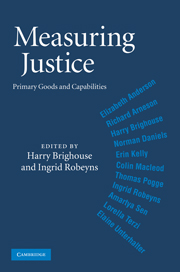Book contents
- Frontmatter
- Contents
- List of contributors
- Acknowledgments
- 1 Introduction: Social primary goods and capabilities as metrics of justice
- PART I THEORY
- PART II APPLICATIONS
- 6 Capabilities, opportunity, and health
- 7 What metric of justice for disabled people? Capability and disability
- 8 Primary goods, capabilities, and children
- 9 Education for primary goods or for capabilities?
- 10 Gender and the metric of justice
- PART III CONCLUDING ESSAY
- Index
- References
10 - Gender and the metric of justice
Published online by Cambridge University Press: 05 June 2012
- Frontmatter
- Contents
- List of contributors
- Acknowledgments
- 1 Introduction: Social primary goods and capabilities as metrics of justice
- PART I THEORY
- PART II APPLICATIONS
- 6 Capabilities, opportunity, and health
- 7 What metric of justice for disabled people? Capability and disability
- 8 Primary goods, capabilities, and children
- 9 Education for primary goods or for capabilities?
- 10 Gender and the metric of justice
- PART III CONCLUDING ESSAY
- Index
- References
Summary
Amartya Sen has several times criticized John Rawls's proposal to assess individual well-being for the purpose of social justice in terms of social primary goods. Sen argues that social primary goods do not sufficiently account for inter-individual differences in the ability to convert these social primary goods into well-being. Instead, he claims, social justice should be assessed in the space of capabilities, that is, a person's substantive opportunities for valuable doings and beings.
There is no consensus in the literature on whether we should indeed make interpersonal comparisons in the space of capabilities, rather than social primary goods. Eva Kittay, in an analysis of how justice as fairness deals with dependents and caregivers, argues that Rawls's account of social primary goods has no place for issues of care needs and caregiving, and briefly suggests that a capability-like metric might be more promising (1999, ch. 4 and note 130). Joshua Cohen (1995) argues that, while Sen's critique is persuasive for the case of the disabled and the extreme destitute, primary goods would be a better currency to use for all other cases of distributive justice, because the capability approach poses severe informational requirements. More recently Thomas Pogge argued in defense of primary goods as the metric for justice, and pointed at some deficiencies in the capability metric that would not be sufficiently acknowledged (2002 and his contribution to this volume).
Keywords
- Type
- Chapter
- Information
- Measuring JusticePrimary Goods and Capabilities, pp. 215 - 236Publisher: Cambridge University PressPrint publication year: 2010
References
- 18
- Cited by

